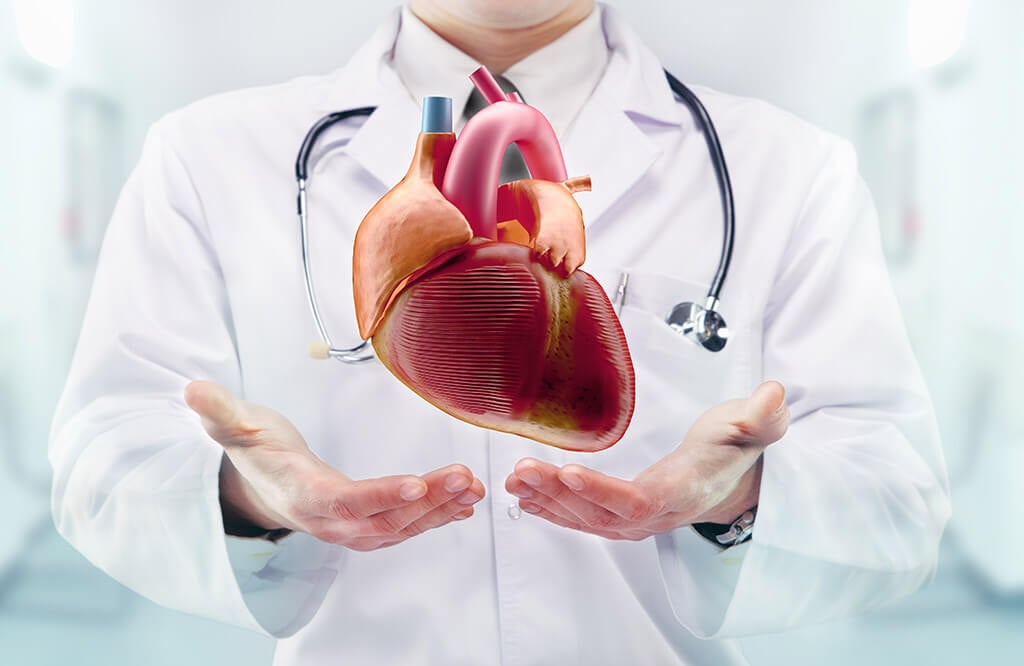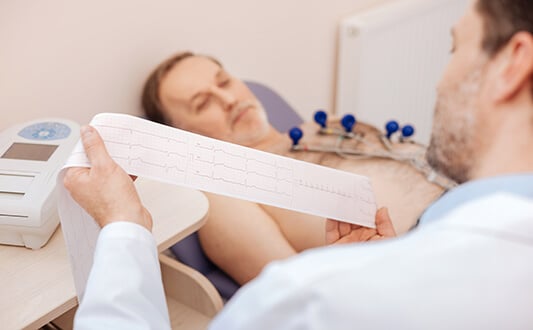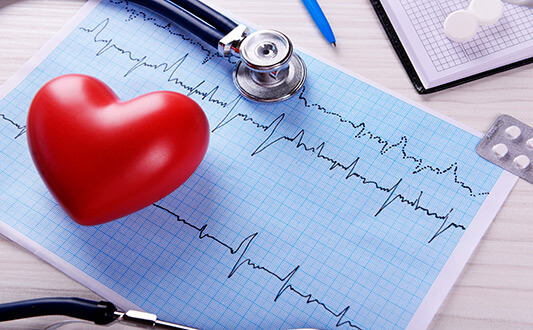IHD (ischemic heart disease) is one of the main reasons causing death in society today. Let’s also discuss what is IHD, causes of IHD and how can one prevent this illness.
Content
- What is IHD?
- IHD etiology
- Risk factors
- IHD pathogenesis
- IHD and angina pectoris prevention
- Hospitals and treatment costs
- Diagnostics and treatment in Germany
What is IHD?
Having seen the corresponding statement in their medical case, patients ask their doctor what is IHD? Let us answer this question.
The question is what is IHD in cardiology? IHD is a group of illnesses caused by the dysfunctional blood supply to the myocardium. Myocardium is the heart’s muscle layer. Its blood supply is managed through the coronary arteries. If they are clotted or there is a cramp (constriction), the heart receives less blood. This process is accompanied by pain behind the sternum. It grows on the basis of the increased demand for oxygen in the myocardium against the inability to provide a normal blood supply.
The most unfavorable outcome of IHD is the development of myocardial infarction and subsequent acute heart failure.
IHD also includes the following terms:
- Angina pectoris (cardiac angina) - pain behind the sternum during physical exercise
- Sudden cardiac death
- Myocardial infarction
- Postinfarction cardiosclerosis
IHD etiology
IHD occurs as a result of the narrowing of the lumen of the coronary arteries. As a result, the access of blood and oxygen to the myocardium decreases. The reasons for reducing the diameter of the vessels may be different. The most frequent is atherosclerosis.
IHD can also be provoked by:
- Spasm of blood vessels (unstable angina)
- Embolism (getting into the coronary arteries of a foreign body)
- Thrombosis (the occurrence of thrombi within the coronary arteries often occurs against the background of atherosclerosis)
- A tumor, an aortic aneurysm or other tumor-like formation (it can squeeze coronary arteries from the outside)
The patient may suffer from ischemic heart disease for several years, but without treatment this diagnosis ends in a fatal outcome. Typically, this disease is characterized by the progression of symptoms.
The causes of death in IHD are necrosis (withering) of the heart. As a result, severe heart failure develops. Blood circulation throughout the body is decreased, the brain does not receive enough oxygen and the person dies.
Risk factors
There are controlled and uncontrolled risk factors of IHD.
Main uncontrolled risk factors of IHD are presented below:
- Age – from 45 years old for males and 55 years old for females
- Gender – Men suffer from IHD considerably more often than women. However, the disease incidence gradually evens out by the age of 70 years old
- Hereditary background – if there were cases of IHD or other cardiovascular pathologies in the family, then probability of the illness develops in the patient. It can also develop at a younger age and is often characterized by a severe clinical course
Risk of IHD is increased by such controlled factors:
- Dyslipidemia - a dyfunction of the metabolism of fats in the body
- Obesity - the higher the body mass index, the higher the risk of coronary heart disease
- Arterial hypertension - depending on blood pressure figures, the probability of coronary heart disease increases by 1.5-6 times
- Diabetes mellitus
Behavioral risk factors are specified separately. They are included into the group of controlled risk factors.
Such IHD risk factors include:
- Diet habit - consumption of large amounts of red meat, fatty foods, low intake of fiber, fresh vegetables and fruits
- Smoking - increases the need for oxygen in the myocardium, increases thrombosis, and disrupts the level of fats in the blood
- Alcohol - moderate intake reduces the risk of coronary heart disease, and consumption of more than 30 grams of pure ethanol per day increases the likelihood of the disease
- Hypodynamy - in people with a sedentary lifestyle, the probability of developing the disease is on average 2 times higher
IHD pathogenesis
Thus, we have found out what IHD is and what causes this illness. Let’s now talk about how IHD disease progresses.
The pathology’s roots lie in the discrepancy between the need for oxygen in the myocardium and the level of its blood supply. In different periods of life and even at different times of the day a person experiences various loads. When he sleeps or sits in front of the TV, the need for oxygen in the heart muscle is minimal.
Even corkscrewed atherosclerotic plaques coronary vessels can cope with its main function: to provide sufficient blood supply to the myocardium.
But, the load increases when a person starts moving. Myocardium needs more oxygen when a person walks. He needs even more blood with more tangible physical activity. Therefore, as the disease progresses, patients with IHD initially lose the opportunity to engage in sports or physical work. Then the person cannot walk for long distances, climb the stairs. In the end, there comes a time when the pain in the heart against a background of insufficient blood supply to the myocardium in IHD is felt even at rest.
Thus, two main factors determine the rate of development and severity of IHD. The first is the diameter of the coronary vessels. The second is the need for oxygen in the myocardium.
It depends on:
- The level of physical activity
- Myocardial contractility
- The size of the heart
- Heart rate
- Blood pressure values
The diameter of the coronary arteries depends on the size of the atherosclerotic plaques that accumulate inside them, as well as the tone of the muscle layer. Spasm of blood vessels in patients with IHD aggravates the manifestations of the disease. Arterial tone is regulated by the level of hormones. It can increase when exposed to a stressful factor, smoking, against the background of a hangover after consuming large amounts of alcohol.
IHD and angina pectoris prevention
There are quite a few effective methods of preventing IHD. For the purpose of using preventive measures, primary and secondary prevention of IHD is allocated. Primary is performed in patients who do not yet have symptoms indicating ischemia of the myocardium, but may be at risk of this pathology. For example, due to age, the presence of unhealthy habits, obesity, a burdened family history. Secondary prevention of IHD is aimed at preventing acute cardiovascular events in the background of chronic myocardial ischemia (oxygen starvation).
IHD prevention can be medicated and non-drug related methods. Medicated involves taking medications. As a rule, it is administered for life. Non-drug prevention is to modify one’s lifestyle and habits.
Recommendations for the correction of lifestyle to prevent the development of IHD are:
- Quit harmful habits. Do not drink alcohol in excess of 30 grams of ethanol per day. This corresponds to 100 g of vodka, 200 g of wine or 0.5 liters of beer. Smoking should also be avoided.
- Normalization of body weight. The body mass index should not exceed 25 kg / m2. You need to get rid of excess weight. Do this through a special diet and with the help of physical training. If necessary, the doctor can prescribe drugs that reduce appetite or block the absorption of fats or carbohydrates. With pronounced obesity and inefficiency of its treatment, bariatric operations can be performed.
- Increased physical activity. A sedentary lifestyle is one of the important risk factors for IHD. If you have a sedentary job, you need to go to the gym, walk more, or cycle. At the same time it will help to normalize weight, if there are problems with it.
- Diet. It is necessary to reduce the intake of animal fats. You should eat more fresh vegetables and fruits. Eat fish or flaxseed oil regularly to supplement omega-3 polyunsaturated fatty acids.
Drugs for prevention are prescribed individually. The prevention is conducted under the doctor’s control.
One can influence the following IHD risk factors with the help of drug prevention:
- Dyslipidemy. To reduce cholesterol, statics are prescribed (atorvastatin, rosuvastatin). Sometimes, with a significant increase in the concentration in the blood of triglycerides, fibrates are used.
- Arterial hypertension. To monitor the blood pressure level the use of antihypertensive drugs is indicated. Drugs of five groups are prescribed: beta-blockers, ACE inhibitors, sartans, thiazide diuretics and calcium antagonists. Doses and schemes are selected individually, based on the numbers of blood pressure, the patient's response to treatment, the presence of concomitant pathology.
- Diabetes mellitus. Careful monitoring of blood glucose levels is necessary. It is more common for type 2 diabetes. In this case, the biguanides (metformin) are administered. If necessary, derivatives of sulfonylureas, alpha-glycosidase inhibitors, and thiazolidinediones are also used.
- Rheological properties of blood. To reduce thrombosis and reduce the risk of myocardial infarction, patients with IHD are prescribed life-long intake of acetylsalicylic acid in a small dose. Usually dosages of 75-100 mg per day are used, which is 5 or more times less than single doses, which are used to relieve headaches or reduce body temperature.
- The need for myocardium in oxygen. Often patients are assigned beta-blockers for this purpose. They reduce the heart rate. In addition, it is one of the groups of drugs used in hypertension.
The most dangerous forms of IHD are the syndrome of sudden coronary death and myocardial infarction. To prevent these acute cardiovascular events, surgical treatment of IHD can be used. The most effective operations are stenting of the coronary arteries and aortocoronary bypass surgery.
Hospitals and treatment costs
Cardiologists, cardiac surgeons and vascular surgeons are engaged in the diagnostics and treatment of ischemic heart disease and its complications. Depending on the clinical case, patients can undergo treatment in the cardiology departments of large university hospitals or choose a small specialized praxis.
Among the hospitals that specialize in the treatment of ischemic heart disease are:
- St. Vincentius Hospital Karlsruhe – Academic Hospital of the University of Freiburg, Department of Cardiology, Angiology and Intensive Care Medicine
- University Hospital Ulm, Department of Cardiology, Angiology and Internal Intensive Care
- University Hospital RWTH Aachen, Department of Cardiology, Pulmonology and Angiology
- Charite University Hospital Berlin, Department of Cardiology and Angiology
- University Hospital Heidelberg, Department of Cardiology, Angiology and Pulmonology
The cost of the medical program is determined for each patient individually, based on the results of the initial clinical and laboratory examination. Average costs of treatment are as follows:
- Cardiological check-up – €1,290
- Diagnostics of IHD – €1,150
- Diagnostics and conservative treatment of IHD – €2,360
- Coronary artery bypass grafting in IHD – €20,980
- Percutaneous transluminal coronary angioplasty in IHD – €7,710
- Cardiological rehabilitation after completion of the main treatment course – €783
Diagnostics and treatment in Germany
Today, everyone can undergo examination and treatment of coronary heart disease in Germany. In the best German hospitals, modern laboratory and instrumental examinations are available. They help to assess and correct the risks of coronary heart disease development, as well as elaborate an optimal treatment regimen. German physicians use all the options of medical and surgical treatment, including unique minimally invasive interventions on the heart vessels.
The company Booking Health is one of the European leaders in the field of medical tourism. Booking Health will assist in arranging a trip to receive medical treatment. We will help you to:
- Choose the best clinic
- Negotiate with the administration about the examination or treatment of a foreign patient
- Get an appointment with the best doctor
- Collect and translate necessary documents
- Get to the right clinic (air tickets booking, airport transfer)
You will receive insurance that will cover any unforeseen medical expenses. In addition, when seeking help with Booking Health, you save up to 70% of the funds.
Choose treatment abroad and you will for sure get the best results!
Authors:
The article was edited by medical experts, board certified doctors Dr. Nadezhda Ivanisova, Dr. Sergey Pashchenko. For the treatment of the conditions referred to in the article, you must consult a doctor; the information in the article is not intended for self-medication!
Sources:
National Center for Biotechnology
JAHA - Journal of the American Heart Association
Read:
Cardiac surgery in Germany – modern treatment of heart disease
Don't know where to start?
Contact Booking Health







